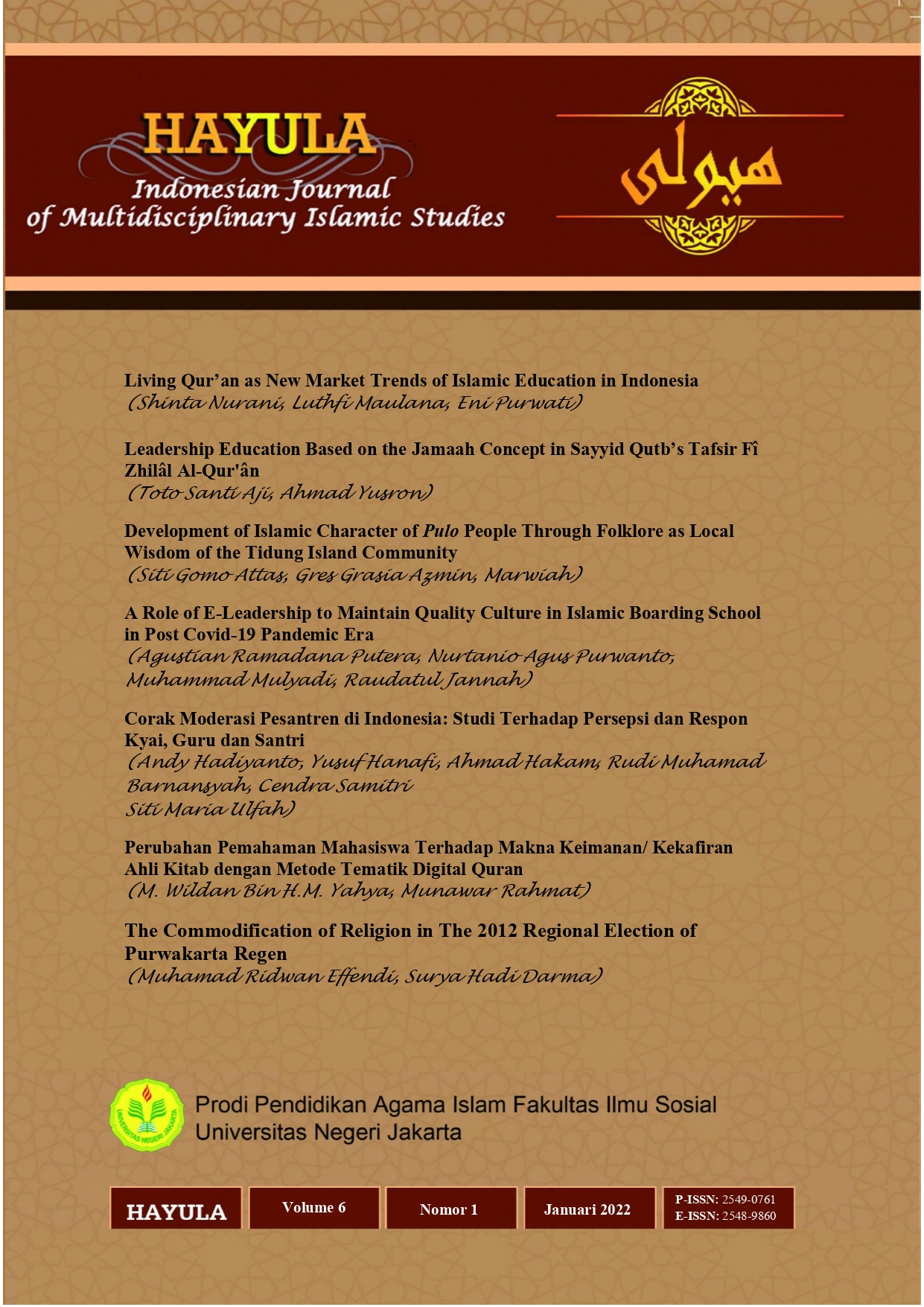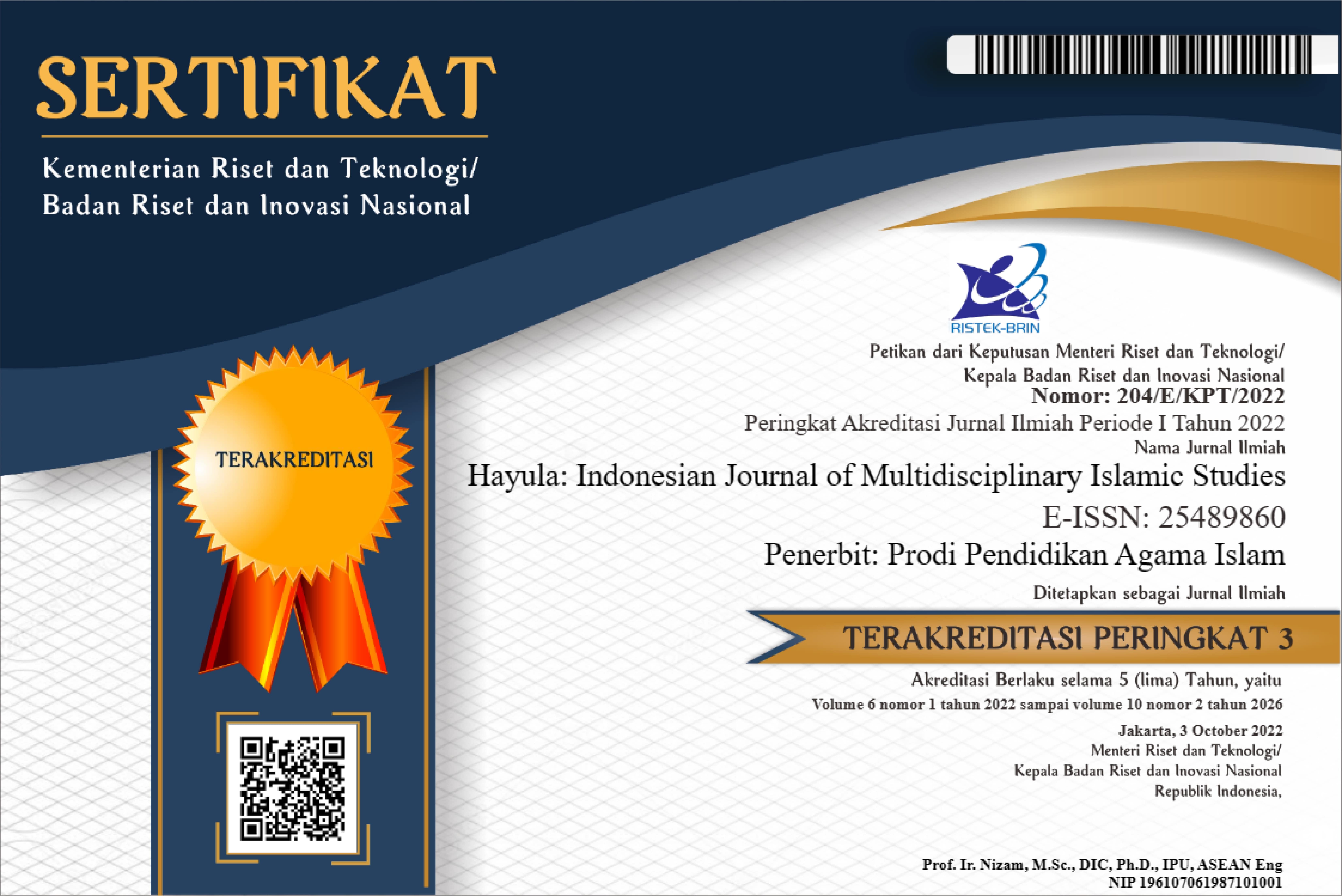Perubahan Pemahaman Mahasiswa Terhadap Makna Keimanan/ Kekafiran Ahli Kitab dengan Metode Tematik Digital Quran
DOI:
https://doi.org/10.21009/hayula.006.01.06Keywords:
method of thematic digital Quran, the meaning of believer, the meaning of unbeliever, the meaning of Ahli KitabAbstract
Muslim students view Ahli Kitab (followers of a non-Islamic religion) as kafir. As a result, they refuse non-Muslims to hold public positions because they are infidels. Whereas the Qur'an confirms that among the Ahli Kitab, some believe, are trustworthy, and are pious. The best solution is to develop a Quran-based Islamic Religious Education (PAI) learning model. The research aims to produce a digital Quran thematic learning model to understand the term Ahli Kitab in Al-Quran. Quasi R&D research method. Model testing at UNISBA and UPI. The themes discussed: the meaning of believing, the meaning of unbelievers, and the meaning of the People of the Book in the Al-Quran. The results of the study describes syntax model digital quran thematic and students' religious mindsets changed. At first, they associated faith and disbelief with religious identity. As for after college, they associate it with good and evil characters. According to the students, there are people of the Book who believe, but more are unbelievers. The implication is that the digital Quran thematic model is quite effective in changing the religious mindset of students.
References
Afandi, Abdullah Khozin. 2001. Memahami Makna Al-Wasilata Berdasarkan Metode Al-Qarafi. Afkaar - Jurnal Pahingan Jamaah Lil-Muqarrabien, XIV.
al-Farmawi, Abd al-Hayy. 1977. Al-Bidayah fi al-Tafsir al-Maudhu’i. Kairo: Matba’ah al-Hadarah al¬`Arabiyah.
al-Qattan, Manna` Khalil. 2001. Studi Ilmu-ilmu Qur’an. Terjemahan Mudzakir AS. (VI). Bogor: Pustaka Litera Antar Nusa.
al-Qurthubi, Syaikh Imam. 2007. Al-Jami` li Ahkaam Al-Quran (Tafsir Al-Qurthubi). Terjemahan Fathurrahman dkk. Jakarta: Pustaka Azzam.
Al-Sadr, Muhammad Baqir. 1990. Pendekatan Tematik terhadap Tafsir al-Qur’an. Jurnal Ilmu Dan Kebudayaan, Vol. 1 (4), 1–28.
Alu Syaikh, Abdullah bin Muhammad. 2009. Lubabut Tafsir min Ibni Katsir, terjemahan M. Abdul Ghoffar dengan judul Tafsir Ibnu Katsir. Cetakan ketujuh. Bogor: Pustaka Imam Asy-Syafi`i, http://www.pustakaimamsyafii.com.
ash-Shiddieqy, Hasbi. 1972. Ilmu-Ilmu Al-Quran. Jakarta: Bulan Bintang.
ash-Shidieqi, Hasbi. 1980. Sejarah dan pengantar Ilmu Al-Qur’an/Tafsir. Jakarta: Bulan Bintang.
ath-Thabari, Ibn Jarir. 2007. Jami` Al-Bayan `an Ta`wil Ayi Al-Quran. Terjamahan Ahsan Askan dengan judul Tafsir Ath-Thabari. Jakarta: Pustaka Azzam.
Dahlan, M.D. 1990. Model-model Mengajar: Beberapa Alternatif Interaksi Belajar-Mengajar. Bandung: CV Diponegoro.
Digital Quran ver 3.1. 2013. Al-Quran dan Terjemahnya (Bahasa Indonesia). Al-Quran dan Terjemahnya penerbit Kementerian Agama Republik Indonesia.
Gall, Walter; Borg; and Meredith Damien. 1983. Educational Research: An Introduction; Fourth Edition (Fifth Edit). New York: Longman.
Joyce, Bruce & Weil, M. 2009. Models of Teaching. New Jersey: Prentice-Hall Inc.
Joyce, Bruce; Weil, M., & Calhoun, E. 2011. Models of Teaching. Terjemahan. (II). Yogyakarta: Pustaka Pelajar.
Katsir, Ibn. 1987. Tafsir Al-Qur’an Al-Karim. Beirut: Dar al-Ma’rifat.
Khairunnisa, S., Hakam, A., & Amaliyah, A. (2018). Pengembangan Media Pembelajaran Permainan Monopoli pada Mata Pelajaran Pendidikan Agama Islam. Tarbawy: Indonesian Journal of Islamic Education, 5(1), 60-69.
Madjid, Nurcholis. 1992. Islam, Doktrin, dan Peradaban. Jakarta: Paramadina.
Muhsin. 2010. “Perdebatan Penggunaan Hermeuneutika sebagai Metode Penafsiran Al-Quran.” Alqalam Lembaga Penelitian IAIN Sultan Maulana Hasanuddin Banten, Serang, Volume 27 (No. 1), 77–103.
Muthahhari, Murtadha. 2007. Manusia Dan Agama. Bandung: Mizan.
Muthahhari, Murtadha. 2009. Keadilan Ilahi: Asas Pandangan-Dunia Islam. Terjemahan Agus Efendi. Bandung: Mizan Pustaka.
Nasution, Harun. 2006. Bank Makalah: Harun Nasution dalam Seminar di Masjid IAIN Medan 11 Maret 2006. Oleh Hartono Ahmad Jaiz.
Pasha & Darban. 2000. Muhammadiyah sebagai Gerakan Islam. Yogyakarta: LPII.
Rahmat, Munawar. 2012. Manusia Menurut Al-Quran Cenderung Mempertuhankan Hawa Nafsunya. Taklim: Jurnal Pendidikan Agama Islam, 10(2), 105–122.
Rahmat, Munawar. 2012. Manusia Menurut Al-Quran Cenderung Mempertuhankan Hawa Nafsunya. Taklim: Jurnal Pendidikan Agama Islam, 10(2), 105–122.
Rahmat, Munawar. 2015. Implementasi Metode Tematik Al-Quran untuk Memahami Makna Beriman kepada Malaikat-malaikatNya Allah. Taklim - Jurnal Pendidikan Agama Islam, Volume 13 (No.1 Maret 2015), 79–92.
Rahmat, Munawar. 2018. Model Perkuliahan Pendidikan Agama Islam Yang Damai, Moderat, dan Toleran. NADWA Jurnal Pendidikan Islam, Vol. 12 (No. 1 Juni 2018).
Rahmat, Munawar & Fahrudin. 2016. Studi Tematik Al-Quran Tentang Makna Khalifah Fil Ardhi dan Implikasinya Terhadap Pendidikan. In M. A. Somad, M. Syafei, & Dkk (Eds.), The 1st UPI International Conference on Islamic Education: Islamic Education Faces Global Challenges. (223–229). Bandung: Universitas Pendidikan Indonesia.
Rahmat, M., Fahrudin, & Somad, M.A. 2017. Pengembangan Model Pembelajaran ‘Studi Tematik Al-Quran’ melalui Digital Quran dalam Perkuliahan PAI untuk Akselerasi Pemahaman Mahasiswa terhadap Ajaran ‘Inti’ Agama Islam. Laporan Penelitian Tahap III yang Dibiayai Ditjen DIKTI pada LPPM Universitas Pendidikan Indonesia.
Shihab, M. Quraisy. 2000. Wawasan Al-Quran: Tafsir Tematik atas Pelbagai Persoalan Umat. Bandung: Mizan.
Sugioyono. 2017. Metode Penelitian Pendidikan. Bandung: PT Remaja Rosdakarya bekerjasama dengan Program Pascasarjana UPI.
Sulastri, A., Mardhiah, I., & Ismail, Y. (2017). Pengembangan Media Ice Breaker Talking Pen pada Mata Pelajaran PAI Kelas X SMAN 100 Jakarta. Jurnal Studi Al-Qur'an, 13(2), 158-174..
Thabathaba`i, Sayyid Muhammad Husain. 2010. Al-Mizan. Terjemahan Ilyas Hasan. Bandung: Lentera, Cetakan pertama,
Ulfa, Maria. 2013. Mencermati Inklusivisme Agama Nurcholish Madjid. Ejournal.unida.gontor.ac.id, 11 No. 2., 11 (2).
Downloads
Published
How to Cite
Issue
Section
License
Authors who publish with this Journal agree to the following terms:
- Author retain copyright and grant the journal right of first publication with the work simultaneously licensed under a creative commons attribution licensethat allow others to share the work within an acknowledgement of the work’s authorship and initial publication of this journal.
- Authors are able to enter into separate, additional contractual arrangementfor the non-exclusive distribution of the journal’s published version of the work (e.g. acknowledgement of its initial publication in this journal).
- Authors are permitted and encouraged to post their work online(e.g. in institutional repositories or on their websites) prior to and during the submission process, as it can lead to productive exchanges, as well as earlier and greater citation of published works.
Users/public use of this website will be licensed to CC BY







